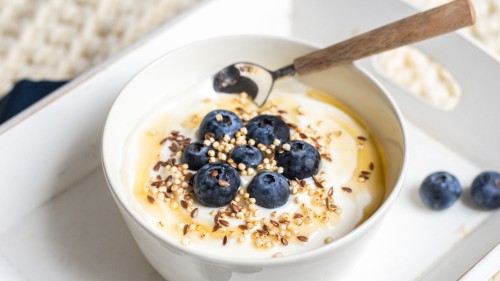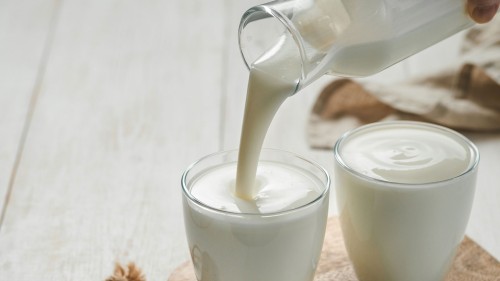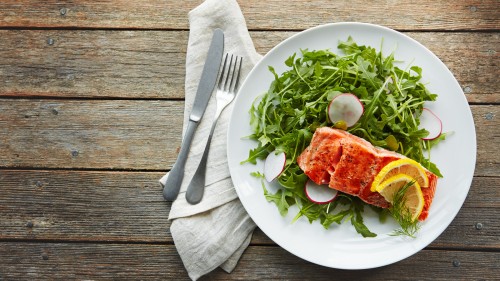WellnessVerge is reader-supported. We may earn a commission when you make a purchase through the links on this page. Learn more about our process here.
Probiotics for Weight Loss: What the Research Shows
Last Updated on February 13, 2024
Medically Reviewed by Anthony Dugarte, MD
Some research links probiotics to weight loss. This article discusses the most effective probiotic strains, dosing, mechanisms, probiotic food sources, and overall evidence on probiotics' potential fat-reducing effects.


Key Highlights
- Probiotics may aid in weight loss by reducing fat storage, inflammation, appetite, metabolism, and insulin sensitivity. However, more research is needed to understand the connection fully.
- Specific strains such as Lactobacillus gasseri, Lactobacillus rhamnosus, and Bifidobacterium breve show promise for promoting weight loss, especially when combined with prebiotics.
- Aim for at least 1 billion CFUs (colony-forming units) from a reputable brand to get probiotic benefits. Look for third-party testing for quality assurance.
- A healthy, high-fiber diet supports the growth of good gut bacteria. Limit processed foods and increase whole grains, fruits, vegetables, nuts, seeds, etc.
- Probiotics work best alongside healthy lifestyle changes like exercise, sleep, stress management, and mindful eating.
Probiotics have increased in popularity due to their numerous health benefits, ranging from reduced gastrointestinal symptoms to mental health support.
But is weight loss one of them? Much of the research surrounding probiotics has explored their use in enhancing digestive health. (1) However, as new research is emerging, scientists are beginning to explore the role of probiotics in weight loss. (2)
These healthy microbes can be found in foods like yogurt, kefir, sauerkraut, tempeh, kimchi, and dietary supplements.
They generally contain a variety of microorganisms. The most common are bacteria that belong to groups called Lactobacillus and Bifidobacterium.
Understanding Your Gut Microbiome
Your gastrointestinal tract is lined with diverse microorganisms that work harmoniously to keep your body healthy.
This complex community of organisms consists of roughly 300 to 500 different species of microbes, including bacteria, fungi, viruses, and protozoa, most of which are beneficial to your gastrointestinal system and overall health.
The helpful bacteria in your gut play an important role in digesting food, absorbing nutrients for your body to use, and helping to create a robust immune system.
Having a healthy balance of gut bacteria is an imperative part of your overall health. An imbalance of gut bacteria, known as dysbiosis, can lead to various digestive issues ranging from bloating to diarrhea.
Research has suggested that having a wide variety of beneficial bacteria in your gut may have far-reaching health benefits. (3)
These benefits include enhancing immune system functioning, decreasing GI symptoms, decreasing symptoms of depression, and reducing the incidence of obesity.
The Link Between Probiotics and Weight Loss
There appears to be a potential relationship between probiotic supplementation, gut microbiome composition, and weight loss.
One 2020 review of the clinical trials found that taking probiotics may potentially improve body weight and Body Mass Index (BMI). This study found that: (4)
- Weight reduction was increased when treated with probiotics for a longer time period.
- A mix of probiotic strains (versus an individual bacterial species) had a better effect on weight management.
- Weight reduction was enhanced when using a probiotic in conjunction with a prebiotic (type of fiber that serves as food for a probiotic), modifying diet, and increasing physical activity.
The researchers noted that the relationship between the gut microbiome and body weight is complex. Further research is needed to understand the role of probiotics in preventing and treating obesity.
Additionally, one 2019 review and meta-analysis found that participants who received probiotic treatments had higher reductions in body fat, waist circumference, and (BMI). (5)
A 2018 review and meta-analysis found that participants who received probiotic supplementation had more significant reductions in body weight, waist circumference, body fat, and BMI than the control groups. (4)
Overall, studies suggest that probiotics may play a role in weight loss by reducing fat storage and accumulation, decreasing inflammation throughout the body, reducing appetite, enhancing metabolism, and improving insulin sensitivity. (6)
One thing to note about probiotics is that a given effect of a probiotic is strain-specific. This means if a study finds a benefit for a specific strain, it cannot be extrapolated to other strains of the same genus or even to others belonging to the same species.
This makes it difficult to conclude how to use probiotics for specific conditions best.
What Probiotic Strains Are Effective for Weight Loss?
When seeking a probiotic to promote weight loss, it’s important to know which strains to look for.
Lactobacillus gasseri
Lactobacillus gasseri is a strain of probiotic bacteria that shows some promise in promoting weight loss. When combined with prebiotics, the L. gasseri strain prompted even further weight loss.
One study found that L. gasseri strains showed weight reduction and anti-inflammatory activity in large-scale studies. (7)
Food sources of L. gasseri include fermented foods like yogurt, kefir, kimchi, tempeh, miso, and sauerkraut.
Lactobacillus rhamnosus
Another strain to look for is Lactobacillus rhamnosus. One study found that L. rhamnosus may help women lose weight and body fat. (8)
Researchers suggested that this specific strain may help obese women achieve long-term weight loss.
L. rhamnosus is often added to dairy products like yogurt, cheese, and milk to boost their probiotic content.
Try adding yogurt, kefir, cultured cottage cheese, or buttermilk to your diet to boost your intake of L. rhamnosus.
Bifidobacterium breve
Bifidobacterium breve is another probiotic strain that may help reduce body fat.
A 2018 randomized, double-blind, placebo-controlled trial found that taking B. breve reduced body fat mass and body fat percentage in pre-obese adults. (9)
Try increasing your intake of high-fiber foods, including whole grains, apples, blueberries, and almonds, which will promote the growth of B. breve in your gut.
Are Probiotics Safe?
Probiotics are considered safe because they support the growth of good bacteria that can already be found in your gut.
On occasion, side effects of probiotics may result in mild gastrointestinal symptoms, including bloating and gas. (10)
According to the National Institutes of Health, probiotics may cause harm in people with severe illness or compromised immune systems. (11)
Probiotic use may not be appropriate for these high-risk individuals, including critically ill patients and premature infants.
Frequently Asked Questions
What probiotic is best for weight loss?
Studies have shown that probiotics that contain the following strains may be best for weight loss: Lactobacillus gasseri, Lactobacillus rhamnosus, and Bifidobacterium breve.
What time should I take probiotics for weight loss?
Some research suggests that taking probiotics just before a meal or with a meal may help the beneficial bacteria survive for longer. (12)
However, being consistent about taking a probiotic may be more important than the timing of the supplement.
Will probiotics help flatten my stomach?
Probiotics may help reduce bloating caused by an imbalance of bacteria in your gut.
While some studies show that taking probiotics may help reduce your waist circumference, more research is needed to better understand this connection.
How can I get more probiotics in my diet?
Whole food, natural sources of probiotics include sauerkraut, kombucha, tempeh, kimchi, miso, and some dairy products like yogurt.
How much probiotic should I take for weight loss?
The number of probiotics per supplement will vary. It is best to look for a probiotic supplement with at least 1 billion CFUs and take the recommended dosage on the label.
The Bottom Line
While the research on probiotics for weight loss shows some promise, it’s important to note that more understanding is needed to establish a stronger link.
Dosages of each individual strain have not yet been determined.
Keep in mind that supplement labels don’t always list the number of specific strains of bacteria they contain. Many brands use a “proprietary blend,” therefore, it is difficult to determine how much of each strain is in the supplement.
As a general rule of thumb, when choosing a probiotic, look for products with at least 1 billion colony-forming units (CFUs).
If you are going to begin taking a probiotic supplement, quality matters. Try purchasing a probiotic from a professional brand or reputable health care professional.
Moreover, look for a product that has been third-party tested. Probiotics that have been third-party certified will have a certification stamp (like ConsumerLab or the USP) displayed on their label from the certification company.
Probiotics might play a role in helping you lose weight, in combination with other healthy lifestyle changes.
The Final Word From an RD
One of the most important factors in maintaining good gut bacteria and a healthy weight is eating a balance of carbohydrates, proteins, and fats.
High-fiber foods can act as a prebiotic, allowing the good bacteria in your gut to thrive.
Eating a diet rich in fiber, including a variety of whole grains, fruits, and vegetables, will “feed” the friendly bacteria in your gut, further enhancing your gut health.
A low fiber diet characterized by processed grains, high fat, and preservatives can harm the good bacteria and compromise the delicate balance of your gut microbiome while reducing the number of good bacteria.
In addition to increasing good gut bacteria, other lifestyle changes may help in your weight loss efforts. These include:
- Beginning an exercise regime that includes both resistance training and cardio.
- Staying hydrated by increasing your water intake.
- Aiming for at least 7 hours of sleep per night.
- Practicing stress-relieving activities like meditation or journaling.
- Including a high protein source at breakfast, like eggs or Greek yogurt.
- Practicing mindful eating by reducing distractions at mealtimes.
At WellnessVerge, we only use reputable sources, including peer-reviewed medical journals and well-respected academic institutions.
- Introduction to the human gut microbiota - PMC:
https://www.ncbi.nlm.nih.gov/pmc/articles/PMC5433529/ - Effects of Probiotics and Synbiotics on Weight Loss in Subjects with Overweight or Obesity: A Systematic Review - PubMed:
https://pubmed.ncbi.nlm.nih.gov/34684633/ - Gut Bacteria in Health and Disease:
https://www.ncbi.nlm.nih.gov/pmc/articles/PMC3983973/ - Probiotics for the Treatment of Overweight and Obesity in Humans—A Review of Clinical Trials:
https://www.ncbi.nlm.nih.gov/pmc/articles/PMC7465252/ - Impact of bacterial probiotics on obesity, diabetes and non-alcoholic fatty liver disease related variables: a systematic review and meta-analysis of randomised controlled trials:
https://www.ncbi.nlm.nih.gov/pmc/articles/PMC6475231/ - The Potential Role of Probiotics in Controlling Overweight/Obesity and Associated Metabolic Parameters in Adults: A Systematic Review and Meta-Analysis:
https://www.ncbi.nlm.nih.gov/pmc/articles/PMC6500612/ - Probiotics, prebiotics and synbiotics for weight loss and metabolic syndrome in the microbiome era:
https://pubmed.ncbi.nlm.nih.gov/30468509/ - Effect of Lactobacillus rhamnosus CGMCC1.3724 supplementation on weight loss and maintenance in obese men and women:
https://pubmed.ncbi.nlm.nih.gov/24299712/ - Effects of Bifidobacterium breve B-3 on body fat reductions in pre-obese adults: a randomized, double-blind, placebo-controlled trial:
https://www.ncbi.nlm.nih.gov/pmc/articles/PMC6081611/ - Probiotics:
https://pubmed.ncbi.nlm.nih.gov/20208051/ - Probiotics: What You Need To Know:
https://www.nccih.nih.gov/health/probiotics-what-you-need-to-know - The impact of meals on a probiotic during transit through a model of the human upper gastrointestinal tract:
https://pubmed.ncbi.nlm.nih.gov/22146689/






